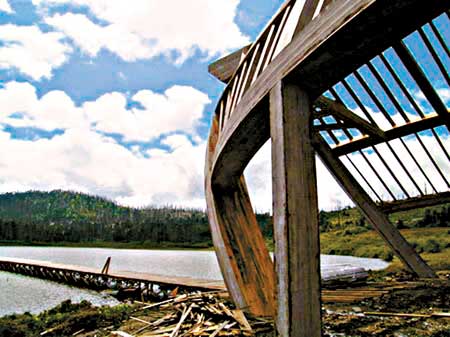Director Chen Kaige's blockbuster film "The Promise" has certainly grabbed
headlines.
First, it was the most expensive domestic film made. with an investment of
340 million yuan (US$42.5 million).

A concrete structure on the shore of Bigu
Tianchi lake. [China Daily] |
Then it was the subject of a popular parody.
Now it's about how the movie company treated the environment at a location
where it built a set and filmed.
"The shooting of 'The Promise' has destroyed the natural sights of Bigu
Tianchi in Yunnan Province's Shangrila," Qiu Baoxing, vice-minister of
construction, said on Tuesday at a forum in Hangzhou, capital of East China's
Zhejiang Province.
A reinforced concrete structure was left on the shore of the lake, and more
than 100 spiles were left in the water, said Qiu, citing media reports.
Moreover, canteens, raincoats, bottles and plastic bags could be seen all
around.
The State Environmental Protection Administration (SEPA), the nation's top
watchdog, has instructed the provincial environmental protection bureau to
investigate the issue, Zhu Xingxiang, a SEPA official, said yesterday.
He said that SEPA had not received a letter of complaint about the movie
company's environmental destruction.
The location involved is at Bigu Tianchi, a mountainous lake at an altitude
of 4,000 metres in picturesque Shangrila County.
Some reports indicated the ecosystem around the lake had also been destroyed.
A China Central Television report dealt with both sides of that issue late last
month.
Qiu's remark was the first official criticism regarding the deterioration of
the lake's environment.
Chen Hong, the movie's producer and Chen Kaige's wife, told People's Daily
that materials had been left behind for auction to help pay for the clean-up.
However, the Chongqing Commercial News reported Chen as saying that the company
had given money to the local government to deal with the aftermath.
No confirmation of any money given to a local government could be made
yesterday, but Li Jufang, an official of the Diqing Tibet Autonomous Prefecture
in Yunnan, said clean-up work had begun.
The concrete structure on the lakeshore has been mostly dismantled, said Li,
who insisted that the work affected the surrounding environment only slightly.
Last August, the movie company sent a letter entrusting disposal of the
material left on site to the prefecture government, Li said.
The prefecture government then told the Shangrila county government to
auction the materials left behind to help pay for the clean-up, the official
said.
"A lesson learnt from the issue is that we will demand that whoever shoots a
movie here in the future is committed to protecting the environment," Li said.
An online survey by the website Sina.com indicated that 95 per cent of the
respondents thought the shooting of the movie destroyed the environment and more
than 80 per cent suggested that authorities adopt regulations to avoid a
repetition of similar accidents.
Lu Xinyuan, another SEPA official, said such regulations would be drafted in
the future. Further spot investigations need to be conducted on whether to ban
or to restrict the shooting of movies at sites with beautiful scenery in the
future.
(China Daily 05/11/2006 page1)